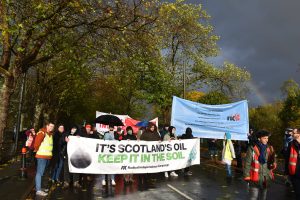This article from Climate Camp Scotland on the forthcoming Climate Camp in Aberdeen from July 26th to August 1st was was first posted by bella caledonia.
AS THE CLIMATE CRISIS HITS HOME, OUR GOVERNMENTS ARE POURING FUEL ON THE FIRE. LET’S STOP THEM.
Britain is baking. England and Wales, for the first time, face the highest level of alert for a heatwave that could kill thousands of people. Across the channel, Portugal, Spain and France are battling some of the worst wildfires Europe has ever seen, with extreme heat causing mass fatalities.The Portuguese Health Ministry reported that between 7 and 13 July, one person was dying from the heatwave every forty minutes.
The climate crisis is on our doorstep. Yet, as anyone paying attention will have realised, the worst is still to come. We know that heatwaves, droughts and wildfires will become more frequent the more climate breakdown progresses. We know that in the next five years, we will likely breach the target of 1.5 degree warming worldwide set out in the Paris Agreement. And we also know that our governments are set on making things worse.
Amid recent political shenanigans, the UK government somehow still found the time to approve the Jackdaw gas field in the North Sea last month. The Cambo oil field, under fresh ownership, is back in play. And while Rishi Sunak (Tory leadership hopeful and richest man in the House of Commons) eventually bowed to pressure to introduce a windfall tax on oil and gas profits, he left open a convenient loophole that enables fossil fuel companies to avoid up to 80% of the levy if they invest in even more extraction. In total, twenty-nine new North Sea oil and gas projects are in the pipeline, which together could cause nearly one billion tonnes of carbon pollution.
Instead of using the energy crisis triggered by the Russian invasion of Ukraine to transform the UK’s energy system and end our reliance on oil & gas for good, the government is hellbent on setting us towards a path where it is impossible for the UK to ever reach its climate goals. But let’s not only dwell on an ever more unhinged Westminster government: While the SNP last year has abandoned maximum north sea oil and gas recovery and pays lip service to the notion of a just transition, even more progressive corners of the party remain entranced by fantasy technologies like hydrogen and Carbon Capture and Storage (CCS), which are viewed as a panacea to save a dying industry.
Even with the weakening appeal of an “It’s Scotland’s Oil!” narrative for independence, there is a lack of imagination concerning what Scotland’s future could look like unencumbered by fossil fuels, and how to build a democratic energy system outwith the hands of corporations, as well as a lack of knowledge on how damaging the fossil fuel industry really was for workers and communities across the nation.
A RMT bulletin from March bitterly called out the greenwashing from governments and corporations on “transitioning” and “green recovery”. Right now there is nothing to transition to, as Scotland’s manufacturing base has been left to rot. Meanwhile, over 35,000 workers have been made redundant in the last few years, a trend that will likely continue. Offshore workers, facing decades of boom and bust, know just as much as (or even more than) climate activists about the janus-faced nature of the fossil fuel industry – and most would switch to working with renewables at once if they could.
You might think that at least Aberdeen became rich on the profits of North Sea oil and gas, with every brick of the city being financed by the fossil fuel sector. It’s true that the fossil fuel industry’s influence can be felt everywhere, with oil sponsorship of art galleries, sports teams, and the city’s pride festival. However, the long history of Aberdonian communities’ resistance to, and destruction by, the oil and gas industry should not be forgotten. Back in the 1970s, when North Sea extraction began, Aberdeen bid to be the ‘hub’ city for the North Sea, and the local authority forced through major changes to accommodate the industry, including the demolition of the ‘Old Torry’ village to expand the harbour.
Today, Aberdeen City Council continues to prioritise the industry over its communities. It partnered with BP to deliver its illusory ‘net-zero’ targets and build a new hydrogen hub, pushing false solutions like carbon capture and hydrogen that only extends fossil fuel extractivism as excuses for real, vital change. As Yolanda Cowen from XR Aberdeen said back in 2020:
“You wouldn’t trust a tobacco company to provide cancer care, so why are our political representatives allowing the least trustworthy company to muscle in on the most pressing issue of our time? They are literally the last people who should be asked.”
As they try to expand the harbour area for an “energy transition zone” for fossil fuel companies, they also threaten to redevelop St Fittick’s park – the last freely accessible green space in Torry, Aberdeen. Taking away public space from one of the poorest communities in Aberdeen to hand it over to the oil and gas industry is bad enough – using the project as a greenwashing exercise is beyond cynical.
But it was always those who are least responsible for climate breakdown to suffer most from the fossil fuel industry, both here in Scotland and worldwide. Exxon and Shell have not only wronged communities next to their Mossmorran gas plants in Fife, but have committed decades of destruction and abuse in Nigeria and brutalised communities in Indonesia with the help of paid militias to protect their gas plant. BP is not only greenwashing on behalf of Aberdeen City Council, but has a long history of colonial theft, human rights abuse and ecological devastation in Colombia.

The truth is that neither council, governments nor corporations care about their communities, nevermind what is necessary for achieving climate justice. As a result, they will allow oil and gas to dominate Aberdeen for decades to come, and local, as well as global, communities to experience immense suffering.
This is why it needs climate activists, standing side by side with communities, fighting for climate justice and the true beginning of a just transition. Time and again, mass protests at climate camps have preceded major victories. In 2009 the first Scottish Climate Camp brought people from across the UK to Lanarkshire to join a local and national struggle against coal that by 2016 had seen the end of coal in Scotland. Starting in 2012, anti-fracking camps in England brought national attention to local struggles that saw a halt to fracking across the UK in 2019. In Dakota, USA, rolling resistance by the Standing Rock Sioux tribe brought global attention to their struggle to defend their land from oil pipelines.
Now is our time to transform Aberdeen into a beacon of energy democracy, spearheading Scotland’s transition into a country that prioritises people and the planet over profit. Let’s make it clear to the fossil fuel industry and their spokespeople in government that we will not stand idly by while they set the world on fire. Change will not be handed to us from above – help us fight for it.
Join us this summer at climate camp in Aberdeen, 28 July to 1 August: https://www.climatecampscotland.com
19.7.22
___________
also see:-
Earth Champs – Mike Small, bella caledonia
Two views of Cop26 – Christopher Silver, bella caledonia and Michael Roberts blog
A Crime Against humanity: the ‘Greenwash Festival’ of Cop26
The imperial mode of living: Interview with Markus Wissen, Ben Wray, bella caledonia


